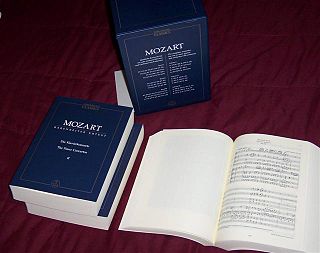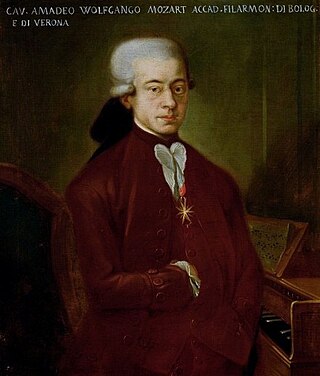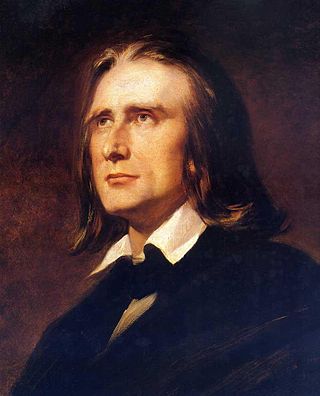Related Research Articles

Wolfgang Amadeus Mozart was a prolific and influential composer of the Classical period. Despite his short life, his rapid pace of composition resulted in more than 800 works of virtually every genre of his time. Many of these compositions are acknowledged as pinnacles of the symphonic, concertante, chamber, operatic, and choral repertoire. Mozart is widely regarded as among the greatest composers in the history of Western music, with his music admired for its "melodic beauty, its formal elegance and its richness of harmony and texture".

Johann Christian Bach was a German composer of the Classical era, the eighteenth child of Johann Sebastian Bach, and the youngest of his eleven sons. After living in Italy for five years (1757-1762), Bach moved to London, where he became known as "The London Bach". He is also sometimes known as "The English Bach", and during his time spent living in the British capital, he came to be known as John Bach. He is noted for playing a role in influencing the concerto styles of Haydn and Mozart. He contributed significantly to the development of the new sonata principle.

Eine kleine Nachtmusik, K. 525, is a 1787 composition for a chamber ensemble by Wolfgang Amadeus Mozart (1756–1791). The German title means "a little night music". The work is written for an ensemble of two violins, viola, cello and double bass, but is often performed by string orchestras. The serenade is one of Mozart's most famous works.

Symphony No. 40 in G minor, K. 550 was written by Wolfgang Amadeus Mozart in 1788. It is sometimes referred to as the "Great G minor symphony", to distinguish it from the "Little G minor symphony", No. 25. The two are the only extant minor key symphonies Mozart wrote.

The Symphony No. 1 in E♭ major, K. 16, is a symphony written in 1764 by Wolfgang Amadeus Mozart at the age of eight years. By this time, he was already notable in Europe as a wunderkind performer, but had composed little music.

The Piano Concerto No. 20 in D minor, K. 466, was composed by Wolfgang Amadeus Mozart in 1785. The first performance took place at the Mehlgrube Casino in Vienna on 11 February 1785, with the composer as the soloist.
The composer Wolfgang Amadeus Mozart went by many different names in his lifetime. This resulted partly from the church traditions of the day, and partly from Mozart being multilingual and freely adapting his name to other languages.

The Köchel catalogue is a chronological catalogue of compositions by Wolfgang Amadeus Mozart, originally created by Ludwig Ritter von Köchel, in which the entries are abbreviated K. or KV. Its numbers reflect the ongoing task of compiling the chronology of Mozart's works, and provide a shorthand reference to the compositions.

The Symphony No. 5 in B♭ major, K. 22, was composed by Wolfgang Amadeus Mozart in The Hague in December 1765, at the age of nine, while he was on his musical tour of Western Europe. Mozart fell seriously ill during his stay in The Hague, and he wrote this composition probably while he was convalescing from his illness.

The Piano Concerto No. 26 in D major, K. 537, was written by Wolfgang Amadeus Mozart and completed on 24 February 1788. It is generally known as the Coronation Concerto.

The Neue Mozart-Ausgabe is the second complete works edition of the music of Wolfgang Amadeus Mozart. A longer and more formal title for the edition is Wolfgang Amadeus Mozart (1756–1791): Neue Ausgabe sämtlicher Werke [Wolfgang Amadeus Mozart (1756–1791): New Edition of the Complete Works].

Symphony No. 14 in A major, K. 114, is a symphony composed by Wolfgang Amadeus Mozart on December 30, 1771, when Mozart was fifteen years old, and a fortnight after the death of the Archbishop Sigismund von Schrattenbach. The piece was written in Salzburg between the composer's second and third trips to Italy. Mozart was also influenced by J. C. Bach's "Italianate" style of composition."
Michael Haydn's Symphony No. 26 in E-flat major, Perger 17, Sherman 26, MH 340, written in Salzburg in 1783, was the first of the only three symphonies published in his lifetime. It was one of several E-flat major symphonies attributed to Joseph Haydn.

Piano Concerto No. 5 in D major, K. 175, was composed by Wolfgang Amadeus Mozart in 1773, at the age of 17. It is Mozart's first original piano concerto; his previous efforts were based on works by other composers. In 1782, he revised the score and composed a new rondo, adding a flute to the instrumentation.
"O du eselhafter Peierl", K. 559a, is a canon composed by Wolfgang Amadeus Mozart. The music, originally in F major, is set for four singers. The words are probably by Mozart himself.

The Symphony in F major, K. Anh. 223/19a, was written by Wolfgang Amadeus Mozart probably in early 1765 in London.
The Symphony in F major "No. 56", K. 98/Anh.C 11.04, was once thought to have been written by Wolfgang Amadeus Mozart, but today is regarded as spurious. As of 2009, it is the only one of Mozart's symphonies published in the Alte Mozart-Ausgabe that has never been recorded. It is not included in the Neue Mozart-Ausgabe.
The Kyrie in F major, K. 33, is a sacred composition for choir and strings by a ten-year-old Wolfgang Amadeus Mozart, dated June 12, 1766. It was written while the composer was in Paris with his family, with the intent to promote his image as a child prodigy.

This article lists the various treatments given by Franz Liszt to the works of almost 100 other composers.

Wolfgang Amadeus Mozart composed four litanies in his service as a church musician for the Salzburg Cathedral, two of which are settings of the Litaniae Lauretanae, the Litany of the Blessed Virgin Mary. The other two are settings of the Litaniae de venerabili altaris sacramento, venerating the Eucharist. Mozart composed the works for four soloists, choir, instruments, and continuo. The litanies appeared in Bärenreiter's Neue Mozart-Ausgabe (NMA) in 1969.
References
- 1 2 Paolo Montanari, "L'invenzione del passato. Note per il concerto 'Autenticamente falso' del Festival Pergolesi Spontini 2017", (in Italian) academia.edu
- ↑ Dexter Edge, "Mozart's Reception in Vienna, 1787–91" pp. 66–117 in Wolfgang Amadè Mozart: Essays on His Life and Music, ed. Stanley Sadie, Oxford University Press, 1996. p. 86, note 65; ISBN 978-0-19-816443-2
- ↑ John A. Rice, "Problems of Genre and Gender in Mozart's Scena 'Misero! o sogno, o son desto', K. 431", academia.edu
- ↑ Miller, Johann Martin (1783). Gedichte. Ulm: Johann Konrad Wohler. p. 190.
- ↑ "Who was Mozart's Laura? – 'Abendempfindung' and the Editors" by David Paisey, Electronic British Library Journal , 2006